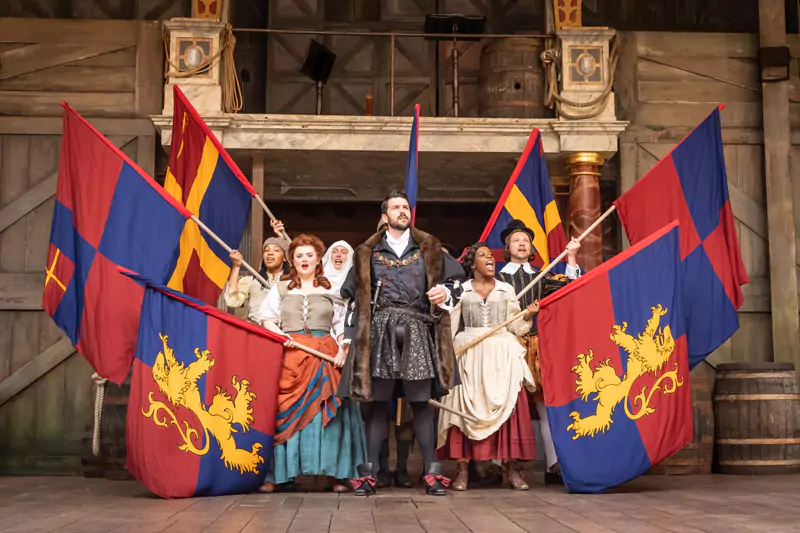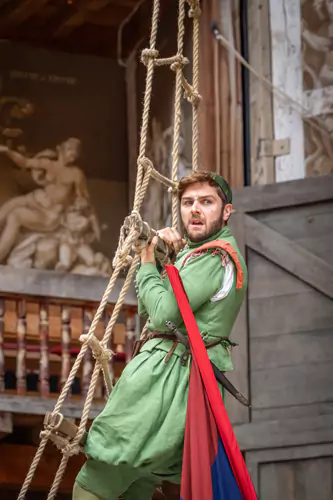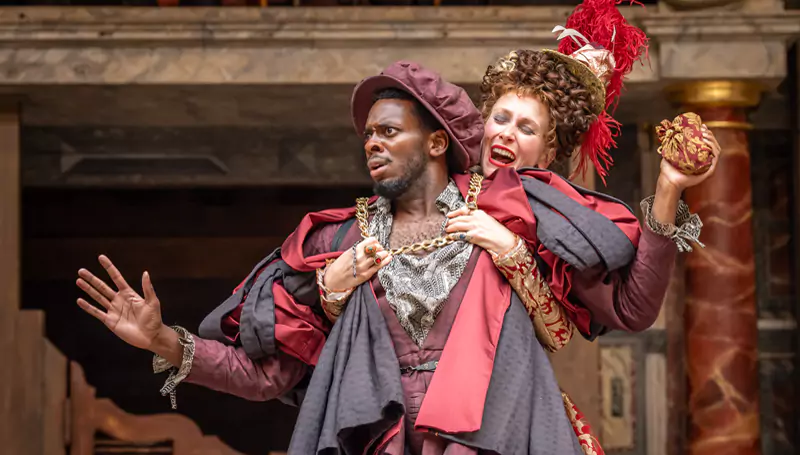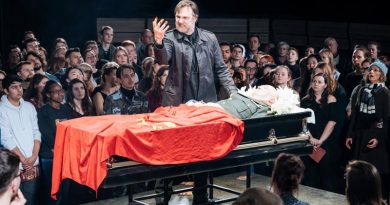“The Comedy of Errors” at the Globe Theatre
Neil Dowden on the South Bank
2 September 2024
A hit during last year’s season at the Globe, Sean Holmes’s anarchic production of The Comedy of Errors (now co-directed with Naeem Hayat) returns with a new cast as the last Shakespeare play in the outdoor arena this year. The summer began with Holmes’s fairly traditional, feelgood account of Much Ado About Nothing – nicely balancing romance with comedy – while this straightforward, though more frenetic show also in period costume goes all out for laughs with a high rate of success.

Photo credit: Marc Brenner.
One of Shakespeare’s earliest plays, The Comedy of Errors is probably his most purely comic one, in fact a farce that revolves around one basic joke in various iterations. Inspired largely by two comedies by the Roman playwright Plautus, the humour stems from mistaken identity concerning two pairs of twins separated soon after birth in a shipwreck. Antipholus of Syracuse and his servant Dromio are searching for their like-named twin brothers (what were their parents thinking of?) and encounter them in Ephesus – though not until the end of the play after a series of misadventures explained by the mix-up. Double trouble indeed.
The implausible back story is explained by the Antipholus brothers’ father Egeon (in hot pursuit from Syracuse) in an extended monologue at the start of the play which can strain an audience’s patience. Holmes and Hayat’s production offsets this static intro by sandwiching it between a bundle of boisterous stage business. First we see a beheading played for belly laughs with the head rolling down the stage as a nationalistic mob chant “Ephesus!” – setting the context for the trade war between Ephesus and Syracuse that threatens the captured Egeon’s life. Then after his monologue there is a passage of gratuitous but entertaining street brawling involving diverse townsfolk including a nun unsheathing a dagger from her crucifix and then wielding a rifle. It sets the scene for a riot of knockabout comedy.
This is literally slapstick humour, with the two innocent Dromios getting a real drubbing from their masters for supposedly not carrying out their duties – but the loud thwack on the cheeks is cartoon violence with no one seeming to be really hurt, like in Hollywood silent comedy. The Comedy of Errors is far from being one of Shakespeare’s more sophisticated plays but occasionally the verbal wit is submerged under a barrage of physicality. And although it is not noted for emotional depth it would have been good to see a bit more feeling expressed when the families are eventually reunited.

Martin Quinn as Dromio of Syracuse.
Photo credit: Marc Brenner.
The breakneck pace is maintained throughout in an interval-less one and three-quarter hour’s staging of Shakespeare’s shortest play. The setting seems to be Elizabethan England rather than the Mediterranean, with an impressive dockside design from Paul Wills featuring a ship’s mast extending above the Yard (though sometimes impeding sightlines), rigging, ropes, barrels, and wooden-boarded frontages on stage, and a jetty at which boats moor for people to disembark. Grant Olding’s wonderful Tudor-style music is played by a band using period instruments in the gallery. Full credit to fight director Masie Carter and movement director Tamsin Hurtado Clarke for keeping the crowd scenes so lively.
The cast revel in the mayhem. Although identically dressed, the two pairs of twins are effectively differentiated: Daniel Adeosun’s Antipholus of Syracuse bears an amusingly baffled even beguiled demeanour throughout, while Caleb Roberts’s angrily frustrated Antipholus of Ephesus draws the short straw in their confusion; and Martin Quinn’s droll, Scottish-accented Dromio of Syracuse is complemented by Sam Swann’s long-suffering, Black Country Dromio of Ephesus. Gabrielle Brooks gives a feisty performance as Antipholus of Ephesus’s dissatisfied wife Adriana, while Shalisha James-Davis plays her sister Luciana disconcerted but flattered by Antipholus of Syracuse’s attentions. Rhys Rusbatch is rather vocally underpowered as the Duke, also doubling as the madcap exorcist Pinch. And a modicum of dignity is provided by Paul Rider’s Egeon and Anita Reynolds’s Abbess as his long-lost wife in a show that celebrates the absurdities of life.









